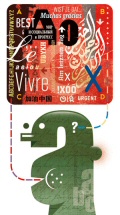 The Economist has an article based on rather a daft premise (‘in search of the world’s hardest language’) that nevertheless manages to cover numerous interesting ways in which diverse languages demand mental somersaults from the speaker or require that the speaker has to think about the world in specific ways.
The Economist has an article based on rather a daft premise (‘in search of the world’s hardest language’) that nevertheless manages to cover numerous interesting ways in which diverse languages demand mental somersaults from the speaker or require that the speaker has to think about the world in specific ways.
Beyond Europe things grow more complicated. Take gender. Twain’s joke about German gender shows that in most languages it often has little to do with physical sex. “Gender” is related to “genre”, and means merely a group of nouns lumped together for grammatical purposes.
Linguists talk instead of “noun classes”, which may have to do with shape or size, or whether the noun is animate, but often rules are hard to see. George Lakoff, a linguist, memorably described a noun class of Dyirbal (spoken in north-eastern Australia) as including “women, fire and dangerous things”. To the extent that genders are idiosyncratic, they are hard to learn. Bora, spoken in Peru, has more than 350 of them.
The article is clearly inspired by psychologist Lera Boroditsky’s recent article for Edge on how language affects how we reason about the world, but it has a wider scope and is a fascinating look at the diversity of the spoken word.
Link to The Economist article ‘Tongue Twisters’.